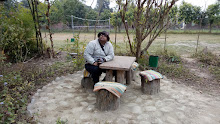Kantakari !!
BOTANICAL NAME: Solanum xanthocarpum Schrad.
FAMILY NAME: Solanaceae
COMMON NAME(s): Yellow-Berried Nightshade, Choti Katheri, Kantkari, Kateli
PART USED: Fruits, Whole Plant.
HABITAT: Wastelands, Roadside as well as Open lands.
DESCRIPTION: It is a very spiny diffused herb, with a height of up to 1.2 meters.
The young branches are densely covered with minute star-shaped hair, while the mature branches are zigzag, covered with yellow, sharp shining prickles and spread close to the ground.
The midribs and other nerves of the leaves have sharp yellow prickles and grow up to 10 cm in length.
The purple flowers, that are 2 cm long with five petals, can be seen in small bunches, sometimes opposite to the leaves.
Kantkari plant bears glabrous, globular drooping berries as fruits, yellow or pale in color, with green veins. The plant is cultivated throughout India.
The herb is also known as Kantakari and Nidigadhika in Sanskrit; Kateli, Katai and Ringani in Hindi; Kantakari in Bengali; Bhuiringani in Marwai; Bhoyaringani in Gujarati; Pinnamulaka, Nelamulaka and Vankuda in Telugu; Kandankattiri in Tamil and Malayalam; Bhejibegun and Ankranti in Oriya; Kandyali, Mahori and Warumba in Punjabi; and Rengnie, Bhat-khataya and Rangaini Janum in Bihar.
PLANT CHEMICAL: (+)- solanocarpine, carpesterol, solanocarpidine, potassium nitrate, fatty acid, diosgenin, sitosterol, isochlorogenic acid, neochronogenic acid, chronogenic acid, caffeic acid, solasodine, solasonine, solamargine, quercetin, apigenin, histamine, acetylcholine.
USES & BENEFITS:>>Kantkari is useful in treating worms, cold, hoarseness of voice, fever, dysuria, enlargement of the liver, muscular pain, spleen and stone in the urinary bladder.
>>Nasal administration of kantkari is beneficial in migraine, asthma and headache.
>>Its dried fruit is used in making cigarettes. The smoke from these cigarettes is held in the mouth cavity, to treat dental infections.
>>The juice of the berries is used in curing sore throat.
>>The fumigation of kantakari is helpful in piles.
>>The herb is made to a paste and applied on swollen and painful joints to reduce the pain and swelling in arthritis.
>>Roots and seeds are used as an expectorant in asthma, cough and pain in chest.
>>The decoction of the root is given with honey, to treat cough.
>>The root is ground to a paste and mixed with lemon to cure snake and scorpion bites.
>>Its stem, flowers and fruits, being bitter and carminative, are used for relieving burning sensation in the feet.
>>Kantakari fruits also facilitate seminal ejaculation, alleviate worms, itching, and fever and reduce fats.
>>The fruit works as an aphrodisiac in males.
>>Its seeds are helpful for treating irregular menstruation and dysmenorrheal in females.
>>The herb is beneficial in the treatment of cardiac diseases associated with edema, since it is a stimulant to the heart and a blood purifier.
CAUTION: Kantkari should not be taken during pregnancy.
SOURCES:>>>>>>http://www.alwaysayurveda.com/solanum-xanthocarpum/
>>>>>>http://saspublisher.com/wp-content/uploads/2014/03/SAJP32-146-149.pdf
>>>>>>http://www.himalayawellness.com/herbfinder/solanum-xanthocarpum.htm
>>>>>>http://nopr.niscair.res.in/bitstream/123456789/10295/1/JSIR%2069(10)%20732-740.pdf
>>>>>>http://www.motherherbs.com/solanum-xanthocarpum.html
>>>>>>http://www.iloveindia.com/indian-herbs/solanum-xanthocarpum.html
>>>>>>http://en.wikipedia.org/wiki/Yellow-fruit_nightshade


%5D+ban+tulsi.JPG)









0 comments:
Post a Comment